As I type this review of the 2018 VW Passat, almost 400,000 of its fellows sit baking in the California desert – punishment for having “cheated” on federal exhaust emissions tests. They are destined to be scrapped, even though there’s nothing wrong with them – other than their having affronted Uncle.
Because of that affronting, the Passat no longer offers the brilliant TDI diesel engine that used to be available in it and most of VW’s other models. Fractional (literally) differences in legal vs. illegal quantities of exhaust emissions have put the kibosh on an engine that was 20-30 percent (whole numbers!) more fuel-efficient than any gas-burning equivalent and which routinely exceeded the advertised EPA city/highway mileage numbers.
I can vouch for this personally, having test driven every TDI-powered VW in the inventory.
Well, which used to be in the inventory.
People ought to be outraged. Not about the “cheating.” About the vilification of VW and the murder of one of the most efficient (and by dint of that, clean) engines which used to be available – and for a fraction of the cost of an elsewhere emissions electric car and thousands less than the cost of a hybrid-electric car.
The good news is that the Passat – and other VWs, for that matter – is more than just a shell around an exceptional engine, now gone.
For one thing, it’s big for its class.
A look at the specs reveals it to be nearly full-sized on the inside. But it has a mid-sized car’s MSRP.
For another thing – and unlike all the cars it competes with – it’s directly related to a much-pricier German luxury car.
For one more thing, it’s still available with a V6. This is a type of engine that’s almost extinct in this class as car companies try to cope with the federal government’s other fatwa – the one that decrees every new car must average “x” miles-per-gallon or be socked with “gas guzzler” fines.
The just-redesigned Honda Accord, as a for-instance, no longer offers more than a four. Neither does the Mazda6, another Passat cross-shop.
So, while you may not be able to get a diesel Passat there are still several excellent reasons to buy a Passat.
WHAT IT IS
The Passat is VW’s top-of-the-line sedan – pending the arrival of the 2019 Arteon, which will become VW’s top-of-the-line sedan.
It’s got a smaller footprint than full-size sedans like the Chevy Impala and Toyota Avalon – but nearly as much room inside. And more room than mid-sized cars in this segment such as the Toyota Camry.
It’s also the only car in this class with German prestige-car kinship.
Prices start at $22,995 for the base S trim, which comes with a turbocharged four paired with a six-speed automatic.
Like most of the others in this class – excepting the new Accord – no manual transmission is available.
A top-of-the-line SEL with VW’s 3.6 liter V6 and a six-speed automated manual (DSG) transmission stickers for $34,650.
The Passat now comes standard with a larger turbocharged four – 2.0 liters vs. 1.8 liters last year – and a bit more horsepower than before – 174 hp now vs. 170 hp last year.
A sport-themed V6 GT ($29,090) version of the Passat is also available, too. It features a tauter-sprung suspension, 19-inch wheel/tire package, more aggressive exhaust tips, powder coated brake calipers, carbon fiber interior trim and sport buckets.
There’s no change in the rated output of the V6, though – so the GT isn’t speedier than last year’s SE/SEL V6.
All 2018 VW models get a new six-year, 72,000 mile standard “bumper to bumper” warranty.
Limo-like back seat. Mid-size car parkability.
$10k less to start than a comparably spacious full-size sedan such as the Toyota Avalon.
Four cylinder Passat is much quicker than much heavier four cylinder-powered Chevy Impala, another more expensive full-sized cross-shop.
Much less thirsty than V6-only Toyota Avalon, another roominess-equivalent cross-shop.
New V6 GT costs thousands less than V6 Camry ($34,400).
WHAT’S NOT SO GOOD
No more manual transmission.
No more TDI.
No horsepower/performance uptick for the new V6 GT.
New Honda Accord has more room inside – and a bigger trunk.
The Passat differs from its rivals in that its standard four cylinder engine isn’t a weak engine.
It’s VW’s excellent turbocharged 2.0 liter four, which is closely related to the 2.0 liter turbo four used in Audi models like the A4 and A6.
It doesn’t come across as ferocious on paper – it’s rated 174 hp is less than the Impala’s standard 196 hp, 2.5 liter four (and much less than the Toyota Avalon’s standard 268 hp 3.5 liter V6) but it’s enough to get the Passat to 60 in about 7.4 seconds – while also delivering 25 city, 36 highway.
This is much better on both counts than the four cylinder version of the Impala, which isn’t particularly fuel efficient (22 city, 31 highway) and noticeably less quick (0-60 takes about 8 seconds) because it’s heavier. 
While the V6 Avalon is quicker (6.4 seconds to 60) it’s also much more expensive – and it uses more fuel (21 city, 31 highway).
So, the 2.0-equipped Passat is something of a wild card in this class.
Power and economy.
Affordability, too.
The only downside – if you’re a gear-jammer type – is that VW no longer sells a manual transmission with the Passat. It’s been taken off the roster for reasons of fuel economy uber alles.
Thus, a six-speed automatic is standard. It has regular and Sport modes and you can manually (well, electronically) hold gears longer when in that mode.
If you want to keep pace with the V6 Avalon and Impala with its optional V6, you’ll want the available 3.6 liter V6, which makes 280 hp and is paired with a speedier-shifting six-speed automated manual (DSG) transmission.
So equipped, the Passat gets to 60 about a second sooner than with the turbo four – and about as quickly as the V6 Avalon/Impala – both of which are larger outside and (again) heavier than the VW.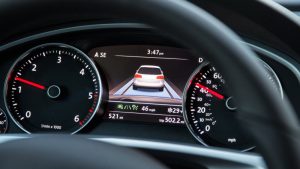
Mileage with the V6 is 19 city, 28 highway, about the same as the V6 Impala’s 18 city, 28 highway) and slightly worse than the Avalon’s class-best 21 city, 31 highway).
You could also go with the Toyota Camry or Accord – the Jetta’s nominal mid-sized rivals. The just-updated Camry is nearly as roomy (though not quite, in back) but – per above – to get one with a V6 means spending about $4k more than you will on a V6 Jetta.
And the Accord no longer offers a V6 at all.
Same goes for the Mazda6, which is only available with a four.
You won’t be disappointed by the four cylinder Passat’s ability to get going.
The turbo engine’s maximum torque (184 ft.-lbs.) is made at just 1,500 RPM – and it’s maintained throughout the power band – so it’s at your disposal whenever you need it.
As a counterpoint, the four cylinder Impala’s torque peak (187 ft.-lbs.) isn’t achieved until you spin the engine to 4,400 RPM – which is 75 percent of redline. Real-world driving-wise, you have to floor the Impala’s gas pedal (and keep it floored) to wring anything approximating acceleration out of it – whereas light pressure on the Passat’s accelerator results in immediate forward thrust.
The Impala’s a very nice big lug of a car – but in four cylinder form, it’s under-engined. The V6 Avalon/Camry are nice, too – and neither are under-engined.
The 2.0-equipped Passat is neither under-engined nor expensive.
You can buy the V6 to get more engine, but it’s not necessary to get enough engine.
In addition to its generous spread of torque, the 2.0 liter engine also has a fun over-rev feature that adds to the spiciness of the experience. Put pedal to the metal and the engine will spin about 600 RPM into the red zone of the tach (about 6,500 RPM) before the transmission shifts up to the next gear. Don’t worry – it’s ok – the engine is built to handle this or VW would not have programmed it to spin that high.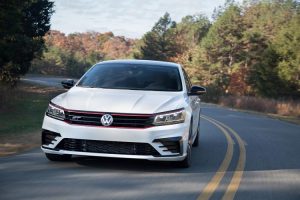
It’s just a shame VW doesn’t offer this quick-punching turbocharged four with a six-speed manual transmission anymore.
If you like to corner, spring for the R-Line or the new GT. You’ll get bumped up not one, not two but three sizes, wheel-wise, from the base car’s 16-inch rims to 19s, shoed with sport tires that sharpen the car’s already excellent reflexes and without killing the ride quality. This is a point worth harping on for a moment. It is often the case that going with 19 or 20-inch wheels results in a car that feels like a Harley hardtail on anything but glass-smooth pavement, of which there’s not much in these days of crumbling infrastructure.
VW (being Audi) knows how to dial in suspensions for handling without killing the car’s ride.
A big part of that equation is getting a handle on the car’s weight.
It’s hard to make a tank like the Impala – which weighs in at almost 3,700 pounds for the four cylinder model – agile and smooth. The Passat 1.8 weighs just 3,263 pounds – vs. 3,662 pounds for the four cylinder Impala. That’s a difference of almost 400 pounds.
Ask a chassis engineer about dealing with that. About tying it all down.
Even the Avalon is a fatty compared with the VW – which is surprising for a Toyota.
Both of them – the Impala and the Avalon – are great highway cars and exceptionally comfortable cruising-around-town cars. But don’t try to keep up with a Passat in the curves.
Another tangible metric of the VW’s superior maneuverability is its much tighter turning circle – 36.4 feet vs. the Impala’s 40 feet and the Avalon’s 38.8 feet.
This isn’t a big surprise given both the Impala and the Avalon are larger on the outside.
Visually, the Passat is less striking than the sleek – and imposing (due to its larger exterior size) Impala.
But its Audi-echoing silhouette is handsome, even elegant – and best of all, there’s no gaping catfish face – a styling trend afflicting too many new cars that will hopefully eventually go away, like parachute pants.
The Passat is mid-sized in terms of its exterior footprint: 191.9 inches long overall vs. 195.3 inches for the full-size Avalon and 201.3 inches vs. the Impala.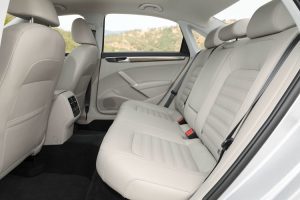
But check the interior specs.
The VW has 42.4 inches of front seat legroom and 39.1 inches in its second row – virtually the same as the Avalon, which has 42.1 inches and 39.2 inches, respectively. The Impala has more front seat legroom (45.8 inches) but the second row is only fractionally roomier (39.2 inches).
The one measure where the VW is mid-sized in terms of interior space is trunk space. It has 15.9 cubic feet of trunk space vs 18.8 cubic feet for the Impala.
On the other hand, the Avalon’s trunk is only 16 cubic feet.
The new Accord is the only nominally mid-sized car (on the outside) that matches – or even beats – the VW’s specs for legroom (42.3 inches up front, 40.4 in the second row) and trunk space (16.7 cubic feet). 
But no V6.
You can get electronic idiot-proofing such as collision mitigation with automatic braking, a blind spot monitor with rear cross-traffic alert and lane departure warning. But these are all optional and so (for now) avoidable.
A foot-swipe trunk opener is available and the Passat has Car-Net smartphone integration which includes Android Auto, CarPlay and MirrorLink.
The new GT package is an interesting start. But it’s missing the one thing that a performance package ought to have.
More performance.
VW probably wanted to offer it – and it would probably be a minor matter (software/tuning) to kick up the output of the V6 to 290 or 300 hp.
The problem is the fatwas.
More performance means lower MPGs and while people who buy performance cars worry about that as much as Trump cares about the feelings of Hillary Clinton, the Hillary Clintons who occupy the federal regulatory apparat care very much about the MPGs your car delivers – and will punish you (via fines imposed on the car’s maker) for using what they consider to be “too much” fuel.
The good news is that Trump is – apparently – dialing back on the fatwas and that means we may see more performance in next year’s Passat GT. Might be worth waiting.
The Passat is also one of the few cars left in the segment with a pull-up emergency brake instead of a push-button electronic parking brake. This means you’ll still be able to stop the car if the engine dies and there’s no electricity to power gadgets such as electronic parking brakes. It also means you can manually modulate emergency braking force by increasing (and releasing) tension on the brake lever. The electronic parking brake is either on – or off.
It’s also no longer under your control, except for the turning on and off.
You control the pull-up emergency brake
THE BOTTOM LINE
The murder of the TDI diesel is among the outrages of our time. But the Passat isn’t down for the count.
Hopefully, neither is VW.
. . .
Got a question about cars – or anything else? Click on the “ask Eric” link and send ’em in!
EPautos.com depends on you to keep the wheels turning! Clovers hate us!
Goo-guhl blackballed us!
Will you help us?
Our donate button is here.
If you prefer not to use PayPal, our mailing address is:
EPautos
721 Hummingbird Lane SE
Copper Hill, VA 24079
PS: EPautos magnets – they’re back! are free to those who send in $20 or more to support the site. Also, the eBook – free! – is available. Click here. Just enter you email in the box on the top of the main page and we’ll email you a copy instantly!


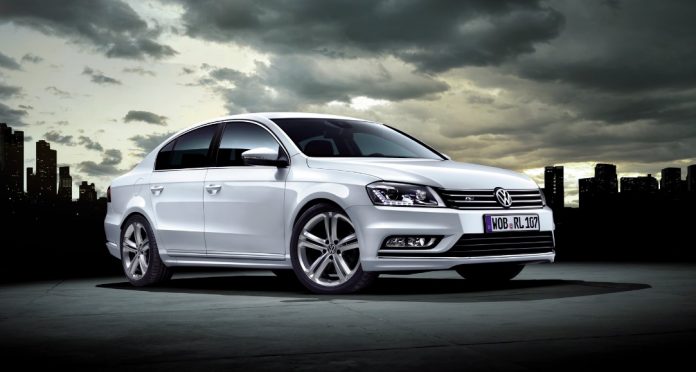

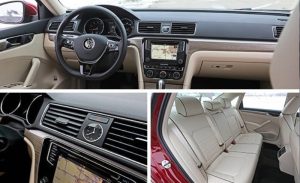

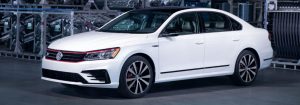




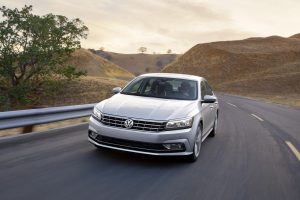










Nice review Eric. I rented a Passat tsi this weekend. Quite a nice car. For a modern car its got very good outward visbility and as Eric noted – solid acceleration. The brakes are a bit touchy so had to get used to that. Has that solid thunk and feel as a german car should. Back seat is quite roomy. Pretty rocking stereo. Lots of”old” fashion – and the best – type knobs for stereo and air conditioning. Overall as good a car available these days.
Thanks, Mark!
As regulars here know, I’m a big VW fan (and multiple owner). They’re great cars – even better cars with those TDI diesel engines!
What I like about the 2.0 is that it appears that it won’t be as heavily stressed as the 1.8. It’s still a turbo, but develops only slightly more horespower and torque. conversely, you can tune the 2.0 to get 220 hp or so on premium fuel. Of course, I’d never do that as premium gas is simply too high.
The biggest mistake I ever made was delaying the purchase if a Passat TDI with manual. I delayed because of travel and the diesel BS attack happened before I got back.
I am however the proud owner of a Cayenne Diesel, it get north of 30 mpg and I am a leadfoot. a 28 gallon tank gives me close to a 900 mile range. I drove from Jacksonville FL to Denver and only had to get fuel once during the trip.
I think that is one of the reasons they came up with this scam, the real pollution difference is not significant, but these cars could derail the whole push to electric and hybrid. Can you imagine the feral government wanting to limit our mobilty?
It was tragic and stupid d I had futile hopes the Don would fix some of this nonsense. I am not holdong my breath
Hi Alex,
I think that’s it, exactly. Diesels threatened the hybrid/electric car Future. They made more economical and functional sense; can’t have that…
VW was developing diesel-powered commuter car capable of 80-100 MPG. Of course, it’s been shunted down the memory hole.
You are making me want to go look at one of the fixed, low-mileage (’cause it sat for a year or two) used TDi Passats around here. Several large preowned-only dealers seem to keep a few on the lot and a couple of VW dealers are (re)selling them too. Whereever the fixes are being done, they seem to be churning them out.
Still the owner of a ‘12 TDI SEL Passat. Bought as a 24 month old CPO w 16k on the ODO. New like car for about 22% ish less than new. We drive 400 miles around town b4 fill ups, out on the interstates, 700-750 miles. My best trip was 1306 miles driven, ave speed 63, ave mpg’s 53. And yet EPA wants to crush it.
My cousins step son has the TDI Jetta. He gets over 50mph with his, no problem, no driving like an old man either. He is planning on keeping his until the wheels fall off (or they won’t allow it to be plated). No emissions where he lives so he should be ok.
Owned a 2013 TDI Jetta wagon with a manual six. I routinely averaged mid to high 40 MPGs in mixed rural, highway and suburban driving. Low 50s was possible on the highway with a gentle foot and long distances.
Having fun with a lead foot in the NH twisties still got low 40s.
Loved driving that little car, in spite of some problems, mostly associated with low profile tires and a finely tuned suspension on roads not much smoother than cobblestones in the winter. It handled like a go cart.
Had to sell it back or take a financial hit I was not willing to absorb, all because of ever fucking Uncle.
After all the dust settled, and VW paid me off (can’t complain there, they paid what I paid, after three years and 75000 miles of use) I ended up in a vehicle that weighed more and burned twice as much fuel.
The bogus “need to reduce fuel consumption”, is an excuse to use more sinister, invasive means to tax the driving public. Eric has given half a dozen reasons for why they are doing this, and some nasty alternatives they will be hurling at us, few, if any, of which will be “optional”. The sheer criminal waste of resources brought on by Uncle’s assault on VW alone, should be making people sick to death of the pigs in D.C.
400,000 automobiles is 400,000 x 60 barrels of oil (in Materials & Energy) x the actual fuel economy advantage of each car, being seized and thrown away for the sake of “our protection”. What big fat load of crap, and what a nation of fucking idiotic, ball-less consumerism this is for swallowing it!
Idiotic, more like uneducated but enough HFC and idiotic is soon to follow. The wife used to work with a dozen other women who thought she was a genius, simply because she could read directions and then follow them, something us senior citizens learned as children.
FF to the 20-40 crowd and they can also read….but it’s just words to them, commonly mispronounced and never understood in their entirety.
I work with a guy who’s 58 and claims his passion in life is music….but he knows only one genre and doesn’t know it as well as I. But, he ain’t no reader. I’ve noticed for decades now people ten years younger than me will often say “I don’t read”. Eh? They mean they only read if it’s forced on them such as a tech manual or similar.
Their reading comprehension suffers as a result and their interest in other than a narrow band suffers also. I mentioned something to the guy I worked with about the Clive Bundy situation and how a federal judge had slapped a federal agent on the hand, no real teeth to the ruling except to let some civilians off the hook for trumped up crimes that opened doors to some lawsuits against the feds. He looked at me like I was speaking Swahili and said “I have no idea what you’re talking about”. That ended the would be conversation. He has no idea of what is happening elsewhere in the world with one common thread of both of us hating cops.
I sometimes throw something out for the 30’s and 40’s crowd and get some blank stares. Not obscure things by any means but something the LSM doesn’t regurgitate constantly, like anything not praising the status quo or govt.
Then I speak to a neighbor or two who are my age or older and they never miss a beat and commonly know things far beyond what I’d expect….but it’s that ten years difference in schooling. I recall it started in the mid-60’s in high school and was headed downhill rapidly by the late sixties.